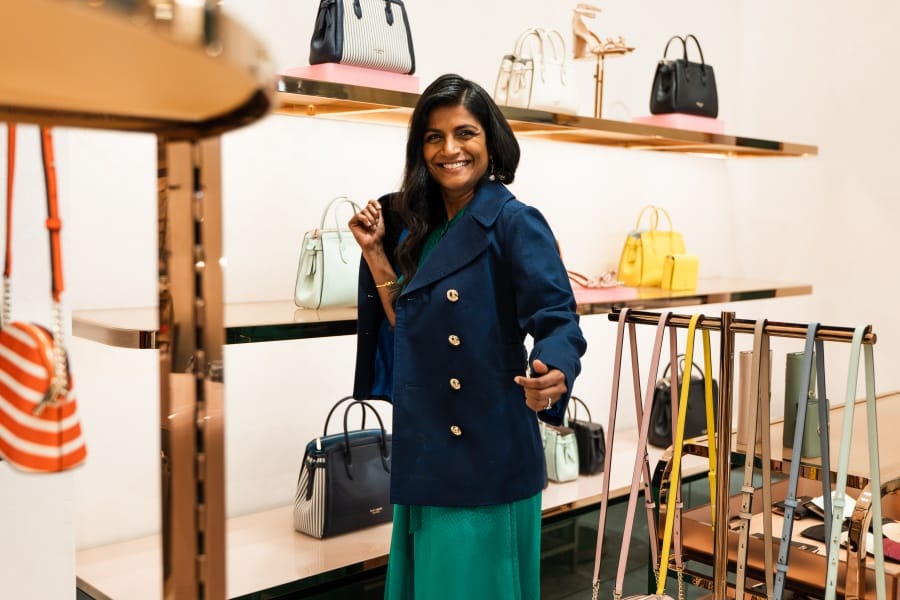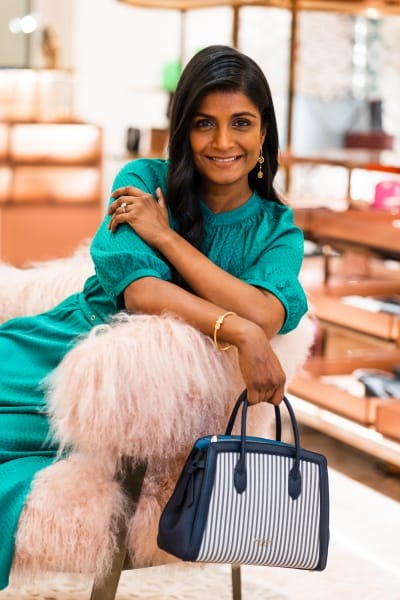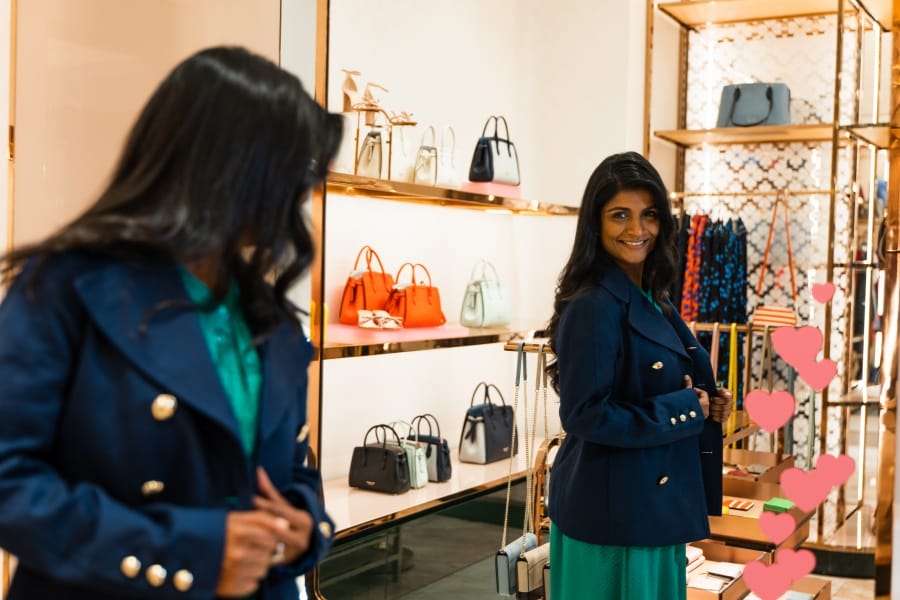To commemorate International Women’s Day this year, New York fashion label Kate Spade is celebrating five exceptional Malaysian women who have made—and continue to make—a difference in the lives of others. Through their line of work and passion, these selfless women challenge inequality and adversity, shedding light on issues affecting women and their surrounding communities.

As a label that believes in supporting strong female leaders, Kate Spade New York is offering a platform for these agents of change to have their voices heard. They are Dr. Jezamine Lim, entrepreneur and the first woman to attain a PhD in Stem Cell and Tissue engineering in Universiti kebangsaan Malaysian (UKM), Dr. Anjhula Mya Singh Bais, international trauma psychologist, Heidy Quah, human rights advocate and founder of Refuge for The Refugees, Nor ‘Phoenix’ Diana, professional wrestler, and Dato’ Shyamala Alagendra, an international lawyer who is currently the Gender and Child Rights Adviser to the United Nations Independent Investigative Mechanism for Myanmar (IIMM).
“International Women’s Day is a global moment for both men and women to reflect on how our actions and our decisions have moved us closer to a more equal society for all genders, and away from discrimination,” says Dato’ Shyamala Alagendra. “When we see injustice and inequality, we should seek to stop it, speak up against it, and applaud and join those who choose to challenge such injustice by word and deed.”
Dato’ Shyamala Alagendra is a Malaysian lawyer who for the last 20 years has used her skills and influence to uphold justice in various countries across the globe. She previously served as the Assistant Director of Public Prosecutions of Fiji where she secured the first life-sentence for child rape in Fiji and the Pacific. She was also a Prosecution lawyer at the Special Panel for Serious Crimes (Timor Leste), Special Court for Sierra Leone (Sierra Leone), and at International Criminal Court (ICC) in The Hague, and was later a member of the prosecution teams that prosecuted former President of Liberia, Charles Taylor and indicted former President of Sudan Omar Al Bashir.

Additionally, Dato’ Shyamala Alagendra has acted as Defence Counsel at the Special Tribunal for Lebanon, EULEX Court (Kosovo) and at the ICC. She has represented victims of human rights violations and sexual abuse in several jurisdictions in Africa and Asia, and has also served as lead investigator for cases of sexual harassment and abuse in the United Nations. In 2018, she was selected as one of the 150 Leading Women by the University of London during the 150th Anniversary of women gaining access to university education in Britain. Dato’ Shyamala Alagendra is also listed as one of the Inspirational Figures amongst Notable Students of the University of London.
Harper’s BAZAAR is honoured to have been given the exclusive to the interview between Kate Spade New York and the formidable force that is Dato’ Shyamala Alagendra.
What does International Women’s Day (IWD) mean to you personally and what is its significance in the work that you do?
International women’s day is a day to celebrate equality, diversity and respect for women. It is a day for both men and women to reflect on how our actions and our decisions have moved us closer to a more equal society for all genders and away from discrimination. It is a day for men and women, to pledge to stand together to challenge stereotypes and unhelpful (and sometimes harmful) assumptions, to call out inappropriate behaviour and prejudice wherever and whenever it happens and to treat women with fairness and respect. Yes, we women need to make this pledge too, to step away from power imbalances and treat the women and girls in our midst with respect and fairness.
It is also a day to make more visible, the plight of women be it at the workplace or during conflict. It is a day to remind ourselves that in order to effectively move towards gender equality, we need to move away from only addressing discrimination through the prism of gender and to also tackle the disadvantage women face based on their intersecting identities such as race, religion, ethnicity and social standing. Women and girls, in particular are often boxed into cultural, tribal, ethnic and religious norms that they may not wish to be confined in. So International women’s days is also about empowerment and choice.
The theme for IWD this year is #ChooseToChallenge—because with challenge comes change. How would you see this reflect in the work that you lead and in what areas do you see there being the greatest need to #ChooseToChallenge?
The theme of this year is great. “Choose to Challenge” says a great deal. It encapsulates empowerment and a duty of all of us not to be spectators going through life oblivious to the big issues around us, but rather, enjoins us to raise our voices and lend action to the dictates of justice and fairness. When we see injustice and inequality, we should seek to stop it, speak up against it—and applaud and join those who choose to challenge such injustice by word and deed. In the work I lead, which is the Gender and Child Rights Adviser to the Independent Investigative Mechanism for Myanmar (IIMM), we vividly see how women and girls are targeted for the most abhorrent of abuses as parts of orchestrated campaigns of violence and terror. We see that they are targeted because of their gender and what it represents to their communities. Amongst the myriad issues that we need to choose to challenge is the idea that in conflict civilians in general are fair game.
We must collectively act when the most vulnerable members of our society, namely women and children, become the targets of abuse be it at home, in the workplace or in conflict. We must hear their voices—and when their voices are silenced by patriarchal hierarchies of power, atrocities and oppression, we owe it to humanity to raise ours in their stead.

What are the lessons you have learned from your career as a distinguished international lawyer that you want to share with others?
Law is a discipline that requires study and practice. This is why we talk about “legal practice”! But the area of law I specialise in contains a body of jurisprudence that can be condensed down to basic principles of humanity. The right to life, the right to live in peace and free from torture or persecution. This is not “ivory tower” law, confined to supreme courts or distinguished seats of academic learning. It is something we all share and have a collective responsibility to protect and advocate for. I have seen teachers take on and lend a hand to rehabilitate child soldiers who terrorised their families and their communities. I have seen victims who have provided witness protection to those that targeted them. I have seen forgiveness even in the midst of unfathomable pain and I have seen pride and dignity return as victims confront their torturer. So the lesson is, we are one family joined by our humanity and when we leave the protection of essential rights to “others” thinking it is too big an issue for us to grapple with, we are doomed to fail ourselves and also our brothers and sisters and generations to come. But when we stand together armed with justice, our humanity cannot be subdued or conquered.
Beyond gender concerns and feminism, what other areas within the world of law today would you say appear either too heavily-focused or neglected?
The rights of children as a discrete category targeted or affected by conflict needs more attention. We have had some discussion in international courts on the phenomena of “child soldiers” but it is unfortunately correct to say that crimes against or crimes which affect children are overwhelmingly lost in the morass of crimes against the general civilian population. Children are subsumed into broader categories of gender as well. This issue needs to be reassessed and corrected, in my view. It is important not only because children represent the most precious and vulnerable part of our community, but they obviously represent the next generation. By viewing children as a separate class of victims, we allow them the opportunity to participate in accountability mechanisms and it is through their voices that we can truly gauge the impact of what they saw and experienced on them. When children are enslaved, or forced into indentured labour, when their schools are bombed or they are denied schooling at all, a huge wound is inflicted on them and on generations to come. There is much evidence to show the trans-generational impact of these abuses and crimes and that the children of the children who suffer or are impacted in this way, are also often deeply affected by the original crimes committed against their parents—even prior to their birth. The cruel and unforgiving nature of these crimes must be properly understood, and I believe and hope that the increased awareness that this will bring may help strengthen our resolve to be intolerant of them so they finally cease. How lovely it would be to live in a world where we could say “dead as injustice” instead of “dead as a dodo”!
Why do you feel that it is important to challenge gender bias, discrimination and stereotypes, even now in 2021?
It is important to challenge injustice anytime and every time. Gender bias, discrimination and preconceived notions of a person’s worth are obviously forms of injustice. The great civil rights battles of the 1960’s, or the anti-apartheid movement of the 1980’s were rallying points and resulted in break through moments. But we now live in a world with both overt prejudice, discrimination and persecution and also what I term as “well packaged” gender bias, discrimination and stereotypes that are there but may not be immediately obvious. Sometimes even advertising and marketing builds on these assumptions and prejudices. So my answer to this question is not “it is important to challenge injustice now because humankind has managed to get Rovers to reach Mars and it is rather nauseating that injustice continues on planet earth.” Though that would also be true. No. It is more simple and maybe more profound. My answer is that it is important to challenge injustice in 2021 because, by the Grace of the Almighty, we live in this time. We live in 2021. It is our responsibility, and it is a collective responsibility we all have. If we don’t challenge injustice that is happening now, who will?
How has the way you understand the world changed over time, and what (or who) has prompted the most significant shifts in your thinking?
Victims and survivors have never stopped forcing me to reassess my thinking and to see things from new perspectives. I am a firm believer that they are the real owners of these international courts, tribunals and mechanism I have been honoured to serve in and we must allow them to be the heroes of their own story. Whenever I have done my work being guided by their voices and their choices, I have seen that justice, in its many forms, has been served more wholly. I will venture, to say: make it less about you, and more about them.

Kate Spade New York is a brand that champions for female empowerment through different initiatives such as their On Purpose social enterprise initiative that has helped to empower women and girls to be the heroines of their own stories. And they create pieces that celebrate femininity. What do you think of the collection that you see before you? (Collection will be shown in-store)
Refreshingly modern-vintage; chic and fun, with elegance. I would have walked into the store to take a closer look at that green dress, regardless!
How do you reward yourself or take time out to treat yourself?
I gain immense joy, energy and emotional strength from the schools I established in Sierra Leone, Kenya and Sri Lanka and by taking part in their activities. My family and my friends (who I view as the family I chose) are my constant companions and time with them is always a gift and a treat for me. I enjoy cooking and the gym.
Fun fashion questions: Printed or Plain?
Plain.
Sling bag or tote?
Tote.
Heels or wedges?
Wedges.
abd. aziz draim
Currently the creative director of BAZAAR, Aziz has been helming architecture, fashion, and design magazines for two decades now, and he’s been doing it in two languages to boot. Citing Rei Kawakubo, Vivienne Westwood and Jean Paul Gaultier as his earliest fashion gurus, this amateur poet believes that nobody deserves an ugly pair of shoes.



